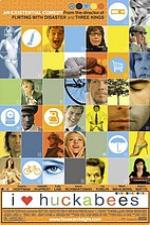

Knight at the Movies ARCHIVES

Brushes With Madness:
Tarnation, I Heart Huckabees
10-13-04 Knight at the Movies column
By Richard Knight, Jr.
Jonathan Caouette’s Tarnation is an astonishing achievement of creative filmmaking. Caouette has pieced
together an account of his mother’s searing journey into the darkness of mental illness and his own descent into
the abyss after her that utilizes snapshots, answering machine messages, grainy super-8 footage and video
diaries, along with lots of pop culture audio and visual references. He assembled the elements on his boyfriend’s
computer with the finished result costing just over $200 – an extraordinary accomplishment by any standard and a
miracle in the movie business. Compared to Tarnation, The Blair Witch Project cost a fortune.
As a filmmaker, Caouette doesn’t dawdle and the raw, jagged style of the movie is like a kick in the face. It’s as if
he’d dumped a scrapbook out on a card table and quickly sorted through the pictures, desperately trying to find the
one that will explain (to both the audience and himself) how such a set of tragic circumstances happened in the
first place. This is a case where truth is stranger – and much more terrible and sadder and complicated – than
fiction. Talk about the beautiful and the damned!
We quickly learn about his mother Renee’s early triumphs as a teen model and then sudden decline into mental
illness, exacerbated by a series of questionable shock treatments. Renee’s brief periods of happiness (a short
lived marriage, Jonathan’s birth, etc.) seem to come further and further apart and soon the sweet-faced Caouette
is being shuffled back and forth between foster families and his grandparents as his mother goes in and out of
mental hospitals.
Then, at the age of 11, Caouette (who is now 31) borrows a neighbor’s video camera and begins documenting his
mundane Dorothy in Kansas everyday existence with his grandparents (where he finally lands) and his colorful,
Dorothy in the Land Of Oz fantasies. The latter is most clearly demonstrated when the pre-teen Caouette does a
series of astounding impeccable drag impersonations directed straight at the camera. Clearly, this was someone
destined to make a noise in the world. At times, I felt like this is what I would have seen if Marilyn Monroe had had
access to a video camera and tape recorder during her troubled childhood.
For a while it seems that Caouette’s intense fantasy life (fueled by the many pop culture influences that we see
and hear) will be enough to see him through (as it has done for countless disenfranchised youth – gay and
straight) but then after unwittingly smoking two PCP laden joints, he ends up spending years being hospitalized
multiple times himself, having fits of rage and staging weekly suicide attempts. But the videotaping goes on and
eventually it becomes apparent that Caouette’s intense narcissism is a safety valve of sorts – a way to channel the
ravages of mental illness – and it makes the constant videotaping and little home movies that much more poignant.
Ironically, Caouette’s gay sexuality seems not to be an issue but rather one of the few stabilizing and joyful things
in his life (he and his high school boyfriend stage a musical version of “Blue Velvet” that looks like a hoot, for
example). In fact, by the time Renee re-enters his life, it is the strength of the adult Caouette’s gay relationship
that seems to help him decide that he must save her. Like the myth of Demeter and Persophone, Caouette seems
determined to bring her back from the ravages of mental illness – only the roles of parent and child are touchingly,
maddeningly reversed in the process. Although neither emerges unscathed, Caouette’s focus on self as a survival
tactic finally pays off as this harrowing, true-life black comedy draws to a close. And Caouette has returned from
the underworld with his own evidence of having been there – this movie.
+++++++++++++++++++++++++++++++++++++++++++++++++++++++++++++++
Lily Tomlin returns to a starring role in I Heart Huckabees which is reason enough to see this frazzled,
pratfall of a movie that could have also been called “Pretzel Logic” and seems designed for those who loved Being
John Malkovich and The Orchid Thief. But this is not the work of Charlie Kaufman, who scripted those two; it
comes instead from David O. Russell, the writer-director of the vastly underrated, topnotch Three Kings. However,
Russell also wrote and directed the middling Flirting With Disaster, which was filled, like Huckabees, with a host of
eccentric characters.
Tomlin (dressed in sexy black noir gun moll costumes) and husband Dustin Hoffman are “existential” detectives,
hired to figure out the answers to the Big Questions that are bugging their clients. Jason Schwartzman, a college
crowd favorite after his startling debut in Rushmore, plays Albert, a tree hugger who wants to resolve the many
conflicts in his life. The detectives zoom in on his problems with the seemingly perfect Brad (Jude Law) and Brad’s
model girlfriend (the face of Huckabees, the Target-like store they both work for) and soon there are more
complications than Law has movies coming out this month. Mark Wahlberg as an environmentally conflicted
fireman, Isabelle Huppert as a competing French detective who rolls in the mud and others swirl through the comic
miasma.
Russell introduces one audacious scene after another and the performers ring plenty of comedy out of the oddball
situations but the film, like the Charlie Kaufman pictures, eventually drifts away. At one point Albert comments
about “the magic of manure” and I perked up, as here at last was the perfect description for this movie.
Tarnation, I Heart Huckabees
10-13-04 Knight at the Movies column
By Richard Knight, Jr.
Jonathan Caouette’s Tarnation is an astonishing achievement of creative filmmaking. Caouette has pieced
together an account of his mother’s searing journey into the darkness of mental illness and his own descent into
the abyss after her that utilizes snapshots, answering machine messages, grainy super-8 footage and video
diaries, along with lots of pop culture audio and visual references. He assembled the elements on his boyfriend’s
computer with the finished result costing just over $200 – an extraordinary accomplishment by any standard and a
miracle in the movie business. Compared to Tarnation, The Blair Witch Project cost a fortune.
As a filmmaker, Caouette doesn’t dawdle and the raw, jagged style of the movie is like a kick in the face. It’s as if
he’d dumped a scrapbook out on a card table and quickly sorted through the pictures, desperately trying to find the
one that will explain (to both the audience and himself) how such a set of tragic circumstances happened in the
first place. This is a case where truth is stranger – and much more terrible and sadder and complicated – than
fiction. Talk about the beautiful and the damned!
We quickly learn about his mother Renee’s early triumphs as a teen model and then sudden decline into mental
illness, exacerbated by a series of questionable shock treatments. Renee’s brief periods of happiness (a short
lived marriage, Jonathan’s birth, etc.) seem to come further and further apart and soon the sweet-faced Caouette
is being shuffled back and forth between foster families and his grandparents as his mother goes in and out of
mental hospitals.
Then, at the age of 11, Caouette (who is now 31) borrows a neighbor’s video camera and begins documenting his
mundane Dorothy in Kansas everyday existence with his grandparents (where he finally lands) and his colorful,
Dorothy in the Land Of Oz fantasies. The latter is most clearly demonstrated when the pre-teen Caouette does a
series of astounding impeccable drag impersonations directed straight at the camera. Clearly, this was someone
destined to make a noise in the world. At times, I felt like this is what I would have seen if Marilyn Monroe had had
access to a video camera and tape recorder during her troubled childhood.
For a while it seems that Caouette’s intense fantasy life (fueled by the many pop culture influences that we see
and hear) will be enough to see him through (as it has done for countless disenfranchised youth – gay and
straight) but then after unwittingly smoking two PCP laden joints, he ends up spending years being hospitalized
multiple times himself, having fits of rage and staging weekly suicide attempts. But the videotaping goes on and
eventually it becomes apparent that Caouette’s intense narcissism is a safety valve of sorts – a way to channel the
ravages of mental illness – and it makes the constant videotaping and little home movies that much more poignant.
Ironically, Caouette’s gay sexuality seems not to be an issue but rather one of the few stabilizing and joyful things
in his life (he and his high school boyfriend stage a musical version of “Blue Velvet” that looks like a hoot, for
example). In fact, by the time Renee re-enters his life, it is the strength of the adult Caouette’s gay relationship
that seems to help him decide that he must save her. Like the myth of Demeter and Persophone, Caouette seems
determined to bring her back from the ravages of mental illness – only the roles of parent and child are touchingly,
maddeningly reversed in the process. Although neither emerges unscathed, Caouette’s focus on self as a survival
tactic finally pays off as this harrowing, true-life black comedy draws to a close. And Caouette has returned from
the underworld with his own evidence of having been there – this movie.
+++++++++++++++++++++++++++++++++++++++++++++++++++++++++++++++
Lily Tomlin returns to a starring role in I Heart Huckabees which is reason enough to see this frazzled,
pratfall of a movie that could have also been called “Pretzel Logic” and seems designed for those who loved Being
John Malkovich and The Orchid Thief. But this is not the work of Charlie Kaufman, who scripted those two; it
comes instead from David O. Russell, the writer-director of the vastly underrated, topnotch Three Kings. However,
Russell also wrote and directed the middling Flirting With Disaster, which was filled, like Huckabees, with a host of
eccentric characters.
Tomlin (dressed in sexy black noir gun moll costumes) and husband Dustin Hoffman are “existential” detectives,
hired to figure out the answers to the Big Questions that are bugging their clients. Jason Schwartzman, a college
crowd favorite after his startling debut in Rushmore, plays Albert, a tree hugger who wants to resolve the many
conflicts in his life. The detectives zoom in on his problems with the seemingly perfect Brad (Jude Law) and Brad’s
model girlfriend (the face of Huckabees, the Target-like store they both work for) and soon there are more
complications than Law has movies coming out this month. Mark Wahlberg as an environmentally conflicted
fireman, Isabelle Huppert as a competing French detective who rolls in the mud and others swirl through the comic
miasma.
Russell introduces one audacious scene after another and the performers ring plenty of comedy out of the oddball
situations but the film, like the Charlie Kaufman pictures, eventually drifts away. At one point Albert comments
about “the magic of manure” and I perked up, as here at last was the perfect description for this movie.
A stunning documentary debut, and a pretzel logic of a movie

